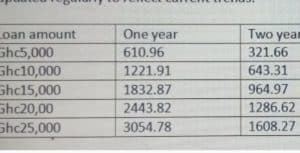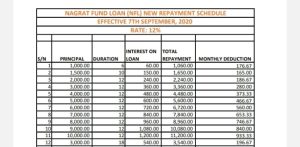Factors used for negotiating salary increment

factors used for negotiating salary
Factors used for negotiating salary increment
Governments around the world negotiate salary increments for their workers. Also, the salaries for private sector workers are influenced by the minimum wage that is determined annually. There are several factors used for negotiating salary increments. The factors used for negotiating salary increments are quite the same across countries.
Salary negotiating parties
The negotiation of minimum wage and/or salaries is done by major stakeholders in the labor market. In Ghana, the major stakeholders are referred to as the tripartite committee.
The tripartite is made up of three parties. The parties are the government’s team, the private sector employers association, and the trade union congress. The tripartite committee is involved mainly in negotiating minimum wage for employees. However, the salary increment for public sector workers involved mainly the government, trade unions, and the fair wages and salaries commission. The committee usually considers the factors used for negotiating salary.
Minimum wage
The minimum wage is the lowest remuneration that employers can legally pay their employees. the baseline income below which employees may not sell their labor.
Since the minimum wage is legally binding, it is in the interest of the private employers to have a greater voice in determining the amount that will be considered as the minimum wage to be paid.
However, the high interest of private sector employers in the minimum wage could be considered as the reason why minimum wages in the country are consistently low. This is because salaries are one of the highest cost components of any institution.
In the eventual interest to gain the maximum profit, the private sector employers would fight to keep the minimum to the lowest level possible. Labor union representatives would, however, insist on the factors used for negotiating salary.
Salary negotiations
Salaries are negotiated from two perspectives. The perspectives are
1. Increasing the value of remuneration based on a varied job description
2. Maintaining the value of remuneration for a fixed job description
1. Increasing the value of remuneration based on a varied job description
Job descriptions for employees can be varied anytime. The variations in the job description for employees are usually out of necessity and for several other considerations.
Recruiting an extra hand for a job that can be done by an existing employee is not considered prudent. Also, restructuring the work system which would lead to a reduction in the work schedule for any reason is possible. When the job description of an employee is varied significantly, it will be prudent to negotiate a commensurate wage.
The negotiation for the commensurate wage could be initiated by the employer or by the employee.
During the negotiation for a wage based on a varied job description, the motive would be to increase/ decrease the salary to match up with the new job description. The factors used for negotiating salary play a minimal role in this negotiation.
2. Maintaining the value of remuneration for a fixed job description
The value of wages or salaries for any job description is susceptible to loss in the original value placed on the job description.
The loss in value of the wage reflects mainly in the inflation rate of the country. Even the exchange rate also reflects in the inflation rate.
However, the inflation rate is not the only factor considered when salaries are being negotiated. Other factors are seen as equally important to determine how much to increase the existing salary for the employee. All factors used for negotiating salary are highly considered in this salary negotiation.
Factors used for negotiating salary
The factors considered during negotiations for salary increments for public sector workers are
a. Inflation rate
b. Ability to pay
c. Opportunity to employ extra employees
c. National security undertones
a. Inflation rate
The inflation rate is a measure of how much prices have increased in percentage terms over a particular period. For instance, when the price of tooth past increased from Ghc10 to Ghc12, then the inflation rate is 20% percent over the reference period. That is (2÷10) x 100%.
Employees wish that the value of their salaries remains intact. Therefore, employees, represented by their union leaders usually use the inflation rate as a reference point to demand salary increases.
A salary increment that is equivalent to the inflation rate means the value of the salary is maintained.
A salary increment that is less than inflation means the original value of remuneration associated with a particular job description has been reduced.
Hardly would an employer negotiate a salary increment that is more than the inflation rate for a job with a fixed job description.
See also: Determinant for 2024 salary increment announced
b. Ability to pay
Employment and salary negotiations are mostly demand and supply. Nobody can be physically forced into any legal employment. Employers try their possible best to take advantage of the demand and supply metrics during salary negotiations.
Taking advantage of demand and supply consideration is even very intense in economies with very high unemployment rates.
Employers usually would claim their inability to pay wages that employees perceive to be commensurate remuneration for the jobs. And also, requests to match salary with inflation are turned down based on the inability to pay by the employer.
Employers could only listen when their very best employees can find alternative jobs.
c. Opportunity to employ others
Sometimes, paying commensurate remuneration to existing employees could mean the employer may not have the ability to recruit extra workers. This is because the enterprise is not profitable enough with the financial muscle to hire extra people. Meanwhile, the enterprise may need extra hands to lessen the workload on the existing employees.
Lack of extra employment would mean the existing workers must work extra.
The employer could bait the employees with the promise of employing extra workers to lessen the workload on the existing employees.
d. National security undertones
Nobody can work in an unsafe environment. The general national security status of the country also determines how much salary is increased.
Citizens must be relatively content with their physical, emotional, and psychological status to be governed. The amount of salary increase must satisfy national security considerations.
Post Disclaimer
The information contained in this post is for general information purposes only. The information is provided by Educative News and while we endeavour to keep the information up to date and correct, we make no representations or warranties of any kind, express or implied, about the completeness, accuracy, reliability, suitability or availability with respect to the website or the information, products, services, or related graphics contained on the post for any purpose.









Thanks